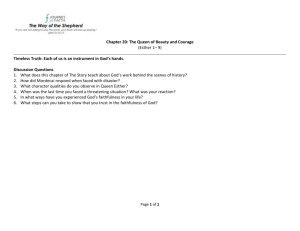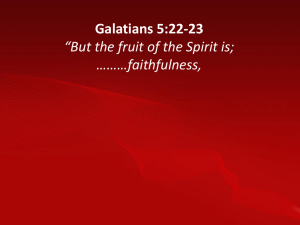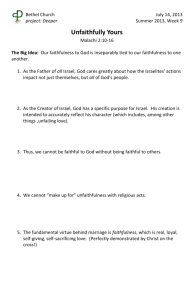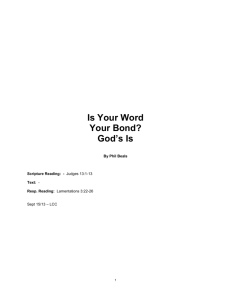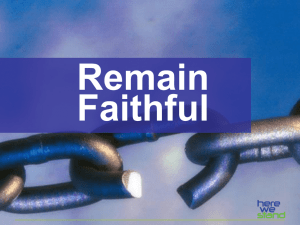YOU, Version 2 - First Christian Church
advertisement
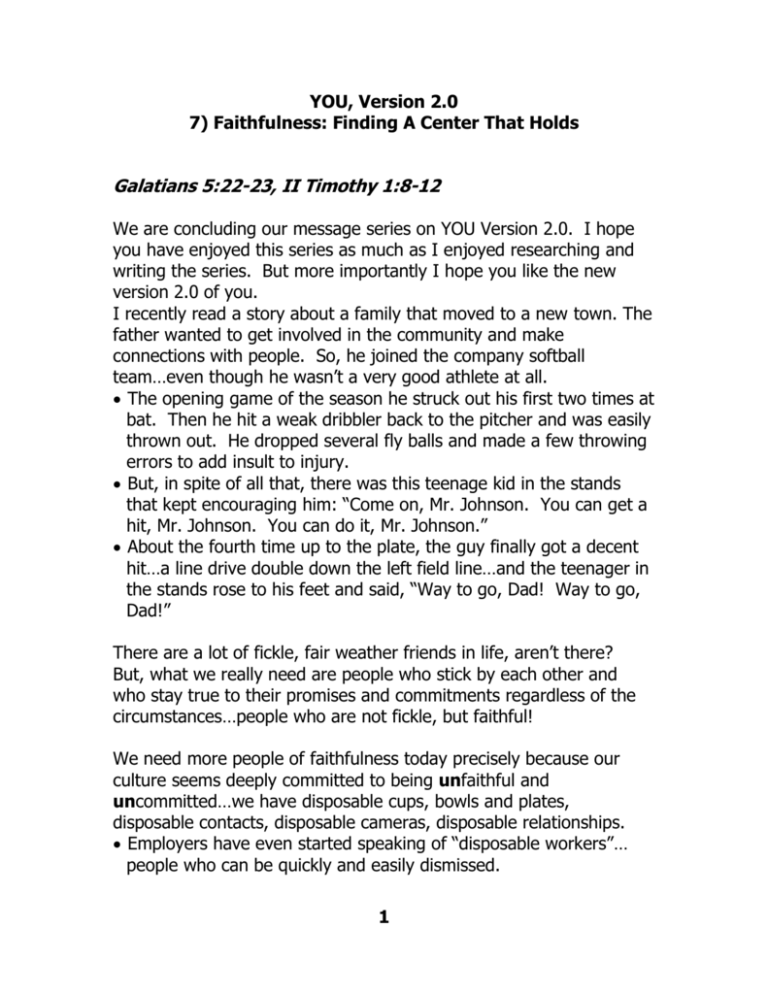
YOU, Version 2.0 7) Faithfulness: Finding A Center That Holds Galatians 5:22-23, II Timothy 1:8-12 We are concluding our message series on YOU Version 2.0. I hope you have enjoyed this series as much as I enjoyed researching and writing the series. But more importantly I hope you like the new version 2.0 of you. I recently read a story about a family that moved to a new town. The father wanted to get involved in the community and make connections with people. So, he joined the company softball team…even though he wasn’t a very good athlete at all. The opening game of the season he struck out his first two times at bat. Then he hit a weak dribbler back to the pitcher and was easily thrown out. He dropped several fly balls and made a few throwing errors to add insult to injury. But, in spite of all that, there was this teenage kid in the stands that kept encouraging him: “Come on, Mr. Johnson. You can get a hit, Mr. Johnson. You can do it, Mr. Johnson.” About the fourth time up to the plate, the guy finally got a decent hit…a line drive double down the left field line…and the teenager in the stands rose to his feet and said, “Way to go, Dad! Way to go, Dad!” There are a lot of fickle, fair weather friends in life, aren’t there? But, what we really need are people who stick by each other and who stay true to their promises and commitments regardless of the circumstances…people who are not fickle, but faithful! We need more people of faithfulness today precisely because our culture seems deeply committed to being unfaithful and uncommitted…we have disposable cups, bowls and plates, disposable contacts, disposable cameras, disposable relationships. Employers have even started speaking of “disposable workers”… people who can be quickly and easily dismissed. 1 Some young couples choose to live together to “keep all their options open” rather than making binding promises to each other. Some Christians join a church…and when things don’t go the way they’d like, they jump ship. But faithfulness says, “Count me in and count on me! I’m here today and I’ll be here tomorrow.” That may not be flashy or exciting…but it’s what binds us together in families, in friendships, and in community…durable, dependable faithfulness. It’s not the most thrilling character quality. It’s not poetic like love…it’s not effervescent like joy…not heroic like peace or patience…not sacrificial like kindness or generosity. But, unspectacular faithfulness is exactly what God needs from us to develop the other fruits of the Spirit. Faithfulness provides the fertile soil in which God best grows love, joy, peace, patience and all the rest. Remember, we’re looking at what Paul calls the “Fruit of the Spirit”. In Galatians 5 Paul gives us a picture of the harvest the Spirit produces in our lives by listing 9 Fruit of the Spirit. It’s his way of underscoring the “ripe life” we can have if we stay connected to Christ. In other words, this is fruit from God’s garden. It’s fruit that’s always tasteful…always in season. When I think of what faithfulness is all about, I’m reminded of Woody Allen’s line…how 90 percent of success is just showing up. Well, faithfulness shows up and faithfulness sticks around. The NT word for faithfulness is the Gr. word “pistis”. It’s translated both “faith” and “faithfulness”, and is used to speak both of our faith in God as well as God’s faithfulness to us. That’s entirely appropriate because it’s our faith in God’s faithfulness that enables us to be faithful! In other words, our faithfulness comes from knowing and growing in God’s great faithfulness. Look at a few examples of how the Bible speaks of God’s faithfulness: 2 Hebrews 10:23 encourages us to “Hold fast to our confession of hope without wavering.” Why? Because, “..he who has promised is faithful.” II Timothy 2:13 says, “If we are faithless…He remains faithful, for He cannot deny himself.” In other words, faithfulness is at the core of God’s identity and to be unfaithful, would be a denial of God’s own essential nature. God can be trusted. Lamentations 3:22-23 – “The steadfast love of the Lord never ceases, his mercies never come to an end; they are new every morning; great is thy faithfulness.” Again, our faith in God’s great faithfulness is what enables us to be faithful! I seldom quote someone like Freidrich Nietzsche in sermons, but he once said, “The essential thing in heaven and earth is…that there should be a long obedience in the same direction...” I love that turn of phrase: a long obedience in the same direction. Whenever I think of that phrase, I think of couples who stood before a church altar fifty or sixty years ago, joined hands and made promises “to have and to hold from this day forward”…and today, they are still loving and cherishing each other…still joined by a promise kept faithfully over the decades. A long obedience. I think of parents who come to stand before this congregation, presenting their children to God in baptism. I think of the promises made to nurture their children in the faith…I think of congregational promises made to stand by the parents and to offer facilities for Christian worship and instruction. These are important promises that call for a long obedience. I think of the sturdy people who were a part of this church’s beginnings …and the people who had the vision to rebuild this church after the fire in the mid 1950’s…their faithfulness during difficult times has made our present growth and potential possible. A long obedience in the same direction. Whether it’s marriage, or parenting, or relationships, or ministry…faithfulness is all about making promises and following through…a long obedience in the same direction. 3 So, here’s my working definition for faithfulness: “Faithfulness is love hanging on”…in spite of circumstances. It’s following through with commitments, regardless of the difficulty…not quitting when the going get’s tough. Remember that I said our faith in God’s faithfulness is what enables us to be faithful? Well, before we look at a biblical example of how that plays out, I’d like to share a contemporary example from our own time. Woodie White received a call when he was serving as a Pastor in Northern Illinois. The call was from his sister and she was screaming, “Woodie! Woodie! You better get home quick! Something has happened to mother!” Woodie White ran out of his house, jumped in his car and started the long drive to his mother’s house some 200 miles away. When he got there he could hardly believe his eyes. His 73-yearold mother had been brutally beaten and robbed by someone who broke into her home. And there she stood…her face was bruised and battered. Her eyes were almost swollen shut. At first, he stood motionless in a state of shock. But then he ran to her, threw his arms around her, and began to cry. Then something strange and special happened. As he was holding his mother, he sensed a familiar aroma. “Mother,” he said, “what’s that I’m smelling?” And she answered, “It’s fried chicken, son.” I thought you might be hungry after your long drive.” Woodie White said that he was so overcome by the wonder of her beautiful spirit in the face of that horrible happening that he broke into tears again...and then she looked up at him and said with deep conviction, “Son, I want to tell you something and I don’t want you to ever forget it. God is still good. God is still good. God is still good!” At the center of her life, Woodie White’s mother had found something that held everything else together…and that something was her trust in God’s goodness and God’s faithfulness. 4 With that in mind, I want to imprint a certain image into your consciousness before turning to our scripture lesson this morning. The image comes from a line in a poem by the Irish poet William Butler Yeats (Yates). The poem, entitled “The Second Coming”, was published in 1939 during those terrible and turbulent times when Hitler was marching through Europe and gobbling up the continent with his madness. Here’s the troubling image from Yeats: “Things fall apart; the centre cannot hold…” I learned what Yeats meant a long time before I read his poetry, because I have my own adolescent memory of what happens when the center doesn’t hold. My memory is based on the difference between 33 RPM and the 45 RPM records. One of the great mysteries of life for me is why the big records have the little holes in them…and the little records have the big holes in them! What’s with that? And the scary thing is that there are a whole lot of young people here who don’t have a clue as to what we’re talking about! (show records). A good friend of mine, Scott Marshall, had one of those nifty little 45 RPM players with the fat spindle in the center…but we didn’t have one of those at my house. I remember bringing my first 45 RPM home…I think it was the Rascals, or The Beatles, or Neil Diamond or maybe The Mama’s and the Papa’s, or something like that…and I placed it on our turntable which, as I said, didn’t have the a fat spindle. I tried to center it as much as I could, set the needle down, and turned it on. It sounded fine for the first few bars…but then the record began to slide across the turntable and the needle began to wobble and bounce…and the whole thing went haywire and became a garbled mess! The thin spindle wasn’t enough to hold the 45 RPM record in place. The center didn’t hold and the result was chaos! That’s what Yeats was feeling, “The center wasn’t holding and everything was falling into chaos.” 5 Contrast those feelings with the deep confidence that’s found in Paul’s letter to Timothy. Like Yeats, Paul was reflecting on some difficult times. He was writing to Timothy from prison in Rome…and everyone had deserted him but Luke. It was a dark and dismal time in his life. He tells Timothy that he knows his death is just around the corner. There would be good reason for this to be a depressing letter; but instead, it pulsates with this bold affirmation: “I know the ONE in whom I’ve put my trust, and I’m sure that he is able to guard until that day what I’ve committed to him.” (II Timothy 1:12) Paul had found a center that would hold…a central truth for his life, which filled him with confidence and called him to faithfulness…even when he was facing his own death. Paul had found a steadfast certainty, a clear center, a solid core of conviction that had the power to focus and strengthen his life. Paul had found a spiritual gravitational center that glued his life together and kept him faithful. Please note two things: 1) Notice the word “whom”. Paul said, “I know whom I have believed in…” The emphasis is on the person of Christ. The lifegiving center for Paul is nothing more or less than the life-changing presence of the living Christ. As pastors we spend a good deal of time organizing things, getting people and programs moving in the church, but the center is not organization, or programs or structures. I care about doctrine…solid scriptural teaching, but the gravitational center of the church is not the specifics of doctrine or the fine points of theology. I believe and love the Bible and am glad that we as Christians are “…a people of one book.” We believe that everything necessary for salvation is found right here. But even the Bible isn’t at the absolute center of the church. We don’t worship the Bible. I love being a Disciples of Christ (by choice, not by chance) and I expect to give the rest of my life to this church that has been so good to me, but the energizing center of my life is not our denominational tradition and heritage. 6 As important as all those things are…and as much as I care about them all…none of them are worthy to stand at the center of my life and faith. Only Jesus Christ is worthy to stand at the center. The kind of assurance that empowers us to be faithful is rooted in our faith in God through the Living Christ. 2) The second thing I want to note is the word “committed”…”He is able to keep that which I’ve committed (or entrusted) to him.” The word is a banking term in Gr. thought and language…literally meaning to make a “deposit.” Paul is saying that he had deposited his entire life and future into the care of God through Jesus Christ and he was sure that this deposit would be faithfully protected. You don’t take your paycheck to the bank for deposit then sit on the steps with a rifle to guard your deposit. Why? Because you trust the institution with which you made the deposit…or you wouldn’t have put it there in the first place. That’s what Paul is saying…I fully trust in the ONE with whom I’ve deposited my life and know that He will be faithful. It was that faith in God’s faithfulness that enabled Paul to be faithful to the end. I learned a long time ago that if you have a big hole in the middle of your record, you need a big spindle to fill it. I have since learned that we all have a huge hole in the center of our souls which can only be filled with the life-giving Spirit of God. We may try to fill it with all sorts of other things…success, money, power, prestige, possessions…but, like a huge, internal sink-hole, it will swallow up all the puny things we try to stuff it with, leaving us empty and hollow every time. There is only one thing in this universe that is big enough to fill the empty space in our souls and serve as the foundation for our faithfulness…and that’s a real relationship with the living God. When we foster that relationship and nourish the presence of the Spirit in our lives, then regardless of what happens, we can hold on. 7 H.G. Spafford was a businessman who lost everything in the Great Chicago Fire. While he was still trying to rebuild his business, he sent his wife and their four daughters on a voyage to Great Britain to visit relatives, planning to take a later voyage to meet them there. On November 22, 1873, there was an accident at sea; the ocean liner was rammed by another ship and it sunk almost immediately. Mrs. Spafford was saved, but all four daughters drowned. When Mrs. Spafford arrived in England she sent a simple two-word telegram to her husband that broke his heart: “Saved Alone.” Spafford took the next available ship to meet her and when the ship reached the place where his four precious daughters had gone under, the captain notified the passengers of the location. Spafford spent a sleepless night, tumbling and turning in his sorrow. Finally, he wrote his feelings down, and they came out in poetry. This is what he wrote: When peace like a river attendeth my way When sorrows like sea billows roll; Whatever my lot, thou hast taught me to say, It is well, it is well with my soul. Things do sometimes fall apart…but for those of us who place our trust in the faithfulness of God…the center will hold. Well folks that’s it, that’s YOU Version 2.0. You in 2013, a more loving, joyous, peaceful, patient, kind, and faithful person. Amen. 8
